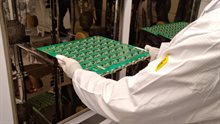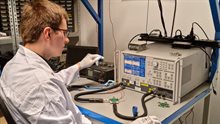An ideal ecosystem
In the FNS partner interviews, we feature a partner every week. Our partners give insight into the developments and innovations within their company and their role in 6G Future Network Services.
In April 2024, we spoke to Dr Niels Kramer, managing director Europe and vice president of marketing at Altum RF. His expertise combines process development of RF semiconductors with general management, project and product management and strategic marketing.
Altum RF designs, develops and markets a wide range of high-quality semiconductors/semiconductors (chips) for high-frequency applications, so-called RF components. RF components are electronic components designed to operate at radio frequencies. They include components such as RF amplifiers, switches, phase shifters and attenuators. These components are used in wireless communication systems, radars, satellite communications, mobile phones and many other applications where signals are sent and received over radio frequencies.

Fabless start-up in the Netherlands
Altum RF was founded in 2018 by leading experts in the RF/microwave industry. Niels is one of the three founders, who previously worked together for a US company. Altum RF was founded in the Netherlands and has had a development office in Sydney from the start. They have since grown from around 7 to more than 20 employees. Altum RF is headquartered on the campus at TU/Eindhoven, with general management, sales, operations and R&D functions. In Sydney, Australia, there is an R&D team with 8 employees. And in Dallas, US, there is an application and sales support office.
Niels explains, " We made a very conscious decision to become a European company at the time, both legally and fiscally. There were several reasons for this such as having a large market area in Europe with fewer (US) competitors, being able to use a large talent pool and better export opportunities. We also have an employee in the Philippines, where a lot of our back-end production takes place, so we can get that better organised locally."
Trends: higher bandwidth and more complex networks
The current rapid growth of RF and millimetre wave components is driven by markets and applications of next-generation telecommunications, satellite communictaion and radar systems. Altum RF concentrates on developing components that meet the demands of more power, higher frequency, higher bandwidth and further integration. Using proven technologies such as leading gallium arsenide (GaAs) or gallium nitride (GaN), they are able to deliver optimal products in terms of RF performance, integration level and cost.
6G networks are expected to use much higher frequencies than current 5G networks, requiring advanced RF components to handle these frequencies. Niels adds: "These semiconductor materials have a higher breakdown voltage and higher eltron mobility than silicon (Si), and therefore have fundamentally better properties to deliver higher powers at higher frequencies. Here, we fit well with trends such as the increasing demand for more bandwidth and the increasing complexity of telecommunication networks."

From 5G to 6G
RF components are extremely important for the development and implementation of 6G networks. Components such as high-frequency amplifiers, filters and antennas will be essential for transmitting and receiving signals in the 6G ecosystem. In addition, new (satellite) technologies and innovations in RF components will be needed to realise the higher data rates, lower latency and greater network capacity of 6G.
FNS as an ideal ecosystem
For Altum RF, participating in FNS is a great added value to realise their dreams and ambitions. "For us, FNS is an ideal ecosystem. We don't need to adjust our roadmap; what we want to do, we can implement within FNS. The technical input of the system integrators is essential to make the 6G components we want to develop in the future seamless with their system requirements. Ultimately, we can also do extra through a piece of funding, which we are of course very happy about."
Altum RF enjoys working with universities, especially TU/Eindhoven, in the high-frequency field. Both for their creative ideas, knowledge and testing possibilities. Niels expects this cooperation - also with the use of more graduate students and with other universities - to increase further in FNS.
Contribution to Program Line FNS
Altum RF participates in Program Line 1, Work Package 1.1 Highly Efficient Transmitters , and Work Package_1.2 _JCAS. Their contribution is to develop the high-frequency semiconductor components for 6G. In this way, they are providing an important piece of the complete 6G puzzle. "A challenge here is the 'long-term component' for us as a start-up, we cannot invest all our R&D in something where we will be in 5 years. So the advantage of a large consortium is that we can organise such long-term issues together with the universities."
Why participate in FNS
Niels sees good opportunities for experimentation through participation in FNS, with more long-term research and riskier concepts. "This is a great opportunity for us to learn the requirements and demands for 6G at an early stage, and thus be able to develop the right semiconductors in time. The FNS project includes our potential customers and also the end customers, so we can anticipate well which chips we need to develop for 6G. We have - currently as a small company - big dreams and growth ambitions, participating in FNS is definitely going to contribute to this."
More information: https://www.altumrf.com/
